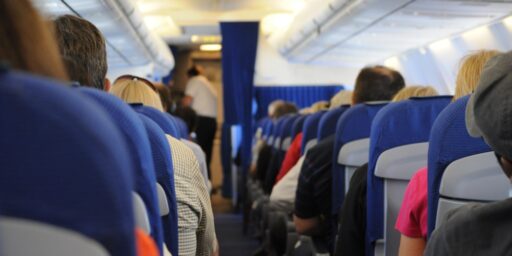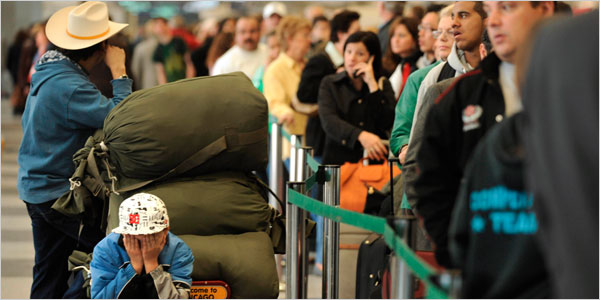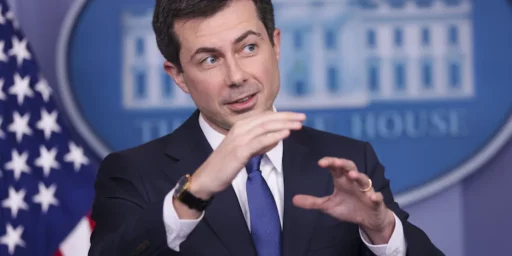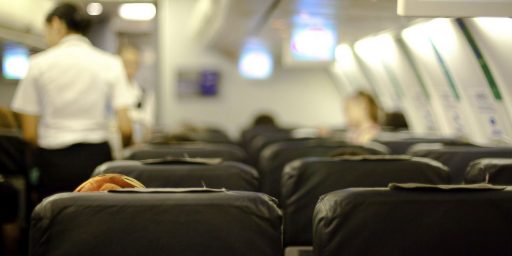Price Transparency
Should businesses have to include taxes and other fees in their advertised price?

NBC News (“Congress may make it harder for you to see the total cost of your next airline ticket“):
Price transparency on airline tickets could be a thing of the past, as House Republicans push to roll back Obama-era rules that prohibit airlines from advertising anything but their all-in prices, including all required taxes and fees.
But Democrats and consumer watchdogs are sounding alarms, saying the change would be a gift to airlines, who could hide the true cost of airfare behind links or fine print — and increase their profits by getting consumers to spend more.
[…]
The Republican provision was tucked into a huge Federal Aviation Administration reauthorization package, one of the few bills considered a must-pass this Congress, by members of the House Transportation and Infrastructure Committee. It was amended, however, to leave some of the Obama-era rule intact — under the amendment, airlines would still be required to be open about any airline-imposed mandatory fees, but they would be allowed to strip out governmental taxes and fees from their advertised rates.
So, two things at the outset. First, given fierce Democratic opposition, this is almost certainly not going to pass into law. Second, I assume the proffered reasons for this move are false and this is a sop to Republican campaign donors.
That said, I actually agree with this:
A spokesperson for the transportation committee chair, Rep. Sam Graves, R-Mo., told NBC News that the provision would allow airlines the same freedom in advertising that other industries enjoy.
and even with this:
A spokesperson for Airlines for America, an advocacy group representing major U.S. air carriers that has fought to kill the transparency law, told NBC News that “this provision would provide clarity on the actual cost of a ticket versus the numerous government taxes and fees that are added.”
The group said the U.S. government collected approximately $20 billion in taxes on commercial aviation last year.
“The American people deserve transparency, and the government should not be able to hide its mandated fees as the base cost of airfare,” a spokesperson for the group said in a statement.
There’s no obvious reason that the airline industry should be singled out for this treatment. Almost no other consumer product advertises taxes and other government fees as part of the sales price.* This is especially true in the travel business. Hotels in particular are notorious for outrageous hidden fees, usually slapped on by localities to foist their tax burden onto people who don’t get to vote.
Still, consumer groups have a good argument:
“This is a bad idea,” said John Breyault, vice president of public policy, telecommunications and fraud at the National Consumers League. “Price transparency makes it easier for consumers to comparison shop. … We don’t want to have to do algebra and advanced trigonometry to figure out what it costs.”
[…]
Studies have found consumers spend more when the total cost of a purchase isn’t disclosed upfront.
“It’s a very simple explanation for why they’re doing it,” Breyault said. “It makes them money.”
“As you go through this process, you’re hitting sort of these psychological trip wires that make us knuckle under, because we think there’s a cost to be stopping this and going back and starting over again,” Breyault added.
Rather than removing a rule that singles out the airlines for special treatment, we should instead impose that rule across the board. I would very much prefer that all advertised prices everywhere be the all-in price. That was the practice in Germany, which has very high value-added taxes, when I lived there more than thirty years ago. Transparency is a good thing.
While I’m sympathetic to the argument from business leaders that there’s utility in making consumers aware of how much they’re paying in taxes, it’s overridden by the uncertainty that not disclosing the true price upfront imposes. It’s too late to change your mind once the bill has been rung up. Or, in the case of hotels—which typically don’t disclose resort fees and the like even at registration—after your stay is over.
__________
*Indeed, the only exception I can think of is gasoline.






Look no further than rapacious telecoms and their scam fee structures to see what airlines have in store for you.
Advertised prices should reflect what the consumer will actually pay, particularly if the ‘fee’ goes to the vendor or is inflicted on similar transactions at a location, i.e. airport concession fees and taxes.
For travelers renting cars, one of the best ways to save money on a trip where you’re renting is to take the shuttle to your hotel and rent the car through an agency that will deliver it to you there (Enterprise is good about that) or take a cab to an off-airport location. I’ve seen the delta between airport and other rental locations be $25/day.
The price advertised should be the price paid, and that should be enacted into law. Of course, that might put auto dealers out of business….
Yes, they should be required, because airlines are not like other businesses. Nor are hotels (or even AirBnB hosts). Nor is TicketMaster. The normal consumer doesn’t know what fees and taxes might be added — say, some state entertainment tax, or a cleaning fee, or whatever. A vendor might also make up a new fee at any time.
These businesses are not like your local retailer, who applies a fixed, well-known sales tax to transactions. Transparency is necessary for there to be competition on cost. Otherwise, consumers aren’t going to have the time to research what the real cost is, or even guess at what might go into the cost.
So I’m agreeing with you, there should be more across-the-board transparency. So does the Biden Administration, who did not single out airlines for their “junk” fees. If there are other businesses who need to do the same (cleaning services, hotels, cruise lines, whoever), then let’s make the same demand of them.
@Kingdaddy: Agreed–there is an important difference between a known X% sales tax markup and these industries (and I just had that happen at a recent hotel stay. Even though I am aware and used to it, it can still be a bit of a shock. You think you are paying X per night, but it is really X+Y and Y can be a substantial percentage increase of X).
And as someone currently looking to buy a car, I really would prefer price transparency.
There’s a problem with that, however. It would mean that nobody could advertise prices on nationally-sold items. McDonald’s, for instance couldn’t have a 99¢ menu, Comfort Inn couldn’t advertise $69 per night, etc. State and local taxes vary widely–something that’s not common in Europe.
Example: When I lived in VA, there were two McDonald’s a couple blocks apart. There was either a municipal or county dividing line between them. Taxes at one were 6%. At the other they were 10%.
When buying vehicles, they’re taxed based on where they’re registered (at least in Wisconsin). We ran into this when I worked for a boat dealership. We were in Columbia County. A buyer from Dane County would pay different taxes than a buyer from Green County–for exactly the same sale price. Under your proposal, the dealer would have to list 73 different prices (72 counties, plus out-of-state). Or maybe more, since I think some municipalities have local taxes to tag on.
@Kingdaddy: @Steven L. Taylor: Yes, fair point on everyday shopping in one’s locality vs the online experience. But the counterpoint is that it would be very hard to have price transparency on some of these things. The “cleaning fee” at an AirBnB/VRBO should absolutely be disclosed but it’s usually on the stay, night the night/week. So, it almost has to be tacked on at the checkout rather than in the listed price.
@Mu Yixiao: I’m less concerned with the “99 cent” promotions and the like since that’s not actually the price. But, yes, an interesting point on the car dealership example. I think they shouldn’t be allowed to advertise a price for the car that doesn’t include unwaivable dealer add-ons (destination fee, processing fee, etc.) that are simply profit. But you’re right that they can’t simply put the tax-included price on the windshield if that varies on a customer-by-customer basis.
Airline pricing is an over-complicated mess on purpose. That said, the system can still be gamed in many ways. For instance, if you got aeromexico.com and select a MEX-LHR flight, you don’t get the round trip price all at once. You first see the fares available for the outbound leg, then you’re pressured to upgrade, then you see the price for the return leg and likewise are pressed to upgrade. Good luck adding that up.
even if you do, you’re still missing the airport use fee, which will be displayed with the “final) full fare. If you want to know how much the fare is, how much the fees are, and how much the taxes come to, you need to find a link, done in lighter type, at the lower right corner. Even then, you need to click on the itemized link in the pop-up box.
It’s easier in travel agency sites, and even in Aeromexico’s own package deal site. there you get a price for the whole package, taxes and fees included (though not itemized). The trick there is a flight’s already picked out. If you change it, the price changes.
The better sites update the whole package price for each option. Others simply tell you how much the changed flight adds.
I assume it’s still true, but 40 years ago, the alcohol tax on cocktails at a restaurant was in the price. I remember having to pull out the 20% for the government when closing the books at night.
The law should mandate an inclusive merchant price and have a separate transaction for taxes paid at sale (gross or itemized by tax jurisdiction). Then the consumer would know the burden their government is on them.
I’ve thought for a long time, since electronic transactions have been widespread, that the taxes should be a separate transaction on the card/bank statement categorized as tax. Only require the merchant to collect and transfer the taxes on cash transactions. But I doubt we’ll see such exposure even if they go to digital currency.
The government/politicians don’t want people thinking about the tax they are paying and few people take notice of the line on the receipt. Withholding for income tax also “hides” the tax so well, people think getting the balance of the free loan they gave the government back is a boon to themselves. Having to write a check in April of each year makes you physically aware instead of just a number in a column of taxes.
@Mu Yixiao:
Sure. But it is well worth the tradeoff.
This could easily be solved by third-party pricing apps, many of which exist. But it seems that many of these do not include all the extra fees, and I’d guess that may be because the airlines condition third-party access to their pricing databases on only showing the fares.
Also, I doubt most governments want this information included because high-tax and high-fee locales would probably have lost tax revenue if people moved their shopping to a lower-tax area. IOW, price transparency would clearly show the more expensive jurisdictions and some number of people would adjust their shopping habits accordingly.
Vehicles and mortgages both require fee disclosures, right off the top of my head. I’m also fairly certain that energy bills and cell phone bills both require transparency disclosures that detail fees. Same with hotel rooms.
For vehicles and mortgages, these are big-ticket items. For the others, they are regulated industries (Edit: hotels aren’t regulated, but these details are provided in any booking I’ve made). Maybe airlines need to be re-regulated?
@James Joyner: regarding dealer advertising; that is a function of the laws af the state. Colorado requires dealer admin fees to be included, but hard ads (tint, protective film, etc) and markup to only be disclosed as a itemized disclosure posted on each car; as an example. Some states don’t require either. I’m not sure if any state requires full disclosure in mass advertising.
@Jen:
For cell phone companies they have to disclose those on the actual bills, but not in the advertising. And one problem is the cell companies need to know your specific service address before they can calculate those since they vary by locality.
T-Mobile has all-inclusive pricing and since they don’t charge those as extra fees, they are not included on the bill in most places. T-Mobile does this to differentiate itself from rivals and basically socializes the taxes and fees across its entire customer base. I like that model a lot, and it’s one reason we changed from AT&T to T-Mobile for our cell phone service.
As a side note: I’ve bought 3 international flights in the past 6 months, and for every one of them, the posted price is what I paid. No extra fees (I travel with carry-on only, so not even a baggage fee).
@Jen:
Yes, pretty much every industry is required to tell you what they’re charging you at the point of sale. But we’re talking here about the posted/advertised price.
If a car has, say, “$30,000” on its windshield in big yellow script, it’ll cost considerably more than that to actually buy the car. There will be dealer add-ons and rather significant taxes.
Hotels are the absolute worst in that most localities tack on various “resort fees” and other nonsense. Sure, you get it with your bill. But it’s too late at that point.
Airlines, almost uniquely, are required to disclose the all-in price at the beginning of the process. I actually think that’s a good idea! But I don’t see why airlines and only airlines have this requirement.
@Mu Yixiao:
One thing that get little attention is the cost of having 50 different tax regimes. I wonder how much this one fact figures into anything that we buy from any business that operates in more then one state? What is the cost associated with having 50 semi-sovereign states?
My guess is more then most people think.
@James Joyner: Ah, apologies. This is what happens if I read too quickly.
Airlines are offering a slightly different product than most consumer items, something that has both dynamic pricing and is not returnable. It’s probably best to compare transportation:transportation, but I can’t really think of anything transportation-wise (other than maybe cruises? or buses–does Greyhound advertise?) that advertises nationally. Rental cars might come close.
The other thing with airlines that is maybe a bit less common that might be contributing to this is the considerable variation from one brand to the next. Southwest doesn’t offer seat assignments while others have a bizarre tiered charging system where two seats in the same row are different prices (hello low-priced middle seat). Some discount airlines charge you for carry-ons. Some airlines allow carry-ons but charge for checked baggage.
The excessive creativity in fees is the real problem, and as far as I can tell *that* may be what is driving the ire at airlines.
@Andy: I have saved literally thousands of dollars by switching to T-Mobile. As an example, between the four members of my family we have collectively spent probably a couple of years outside the country on the T-Mobile plan since 2015. My reminder of what the fees could look like came last month when my wife couldn’t get connected to a friend in New Zealand via “normal” means (Skype, FaceTime, etc) and so made a half hour telephone call, assuming the T-Mobile plan applied to voice as well as data (it doesn’t). I think it was like $50. I remember that on AT&T the first thing I did on landing was search out the a local SIM card supplier in the airport. Once I was incorrectly informed by my IT department that our plan allowed overseas calls (it did, but at international rates) and I got a warning letter at the end of the month because I was in the top ten phone bills for the entire company, which had 40,000 employees. That was 99% data roaming charges
@Jen:
One thing I hate about unbundling and ancillary fees, is they have made comparison shopping between airlines more difficult.
When fares included two checked bags, a carry-on, and free selection of any seat (including exit row and bulkhead seats), it was straightforward to know which airline had a cheaper fare. Now you have to hunt down the cost of checked luggage, carry-on, and seat selection, and add them to the published fare. That takes up time.
@James Joyner: yes, but which tax rate should we use in the car biz since the rate can vary depending on the location of the address you register it. Especially if you are an out of state buyer.
@Andy: @MarkedMan: We’ve switched between Verizon and AT&T every couple of years because, frustratingly, they only offer their “good” deals on new phones to new customers. I’d switch to T-Mobile in a heartbeat, because they’re indeed significantly cheaper for what I consider a commodity product, but my wife had a bad experience with them many years ago and thinks they have poor coverage.